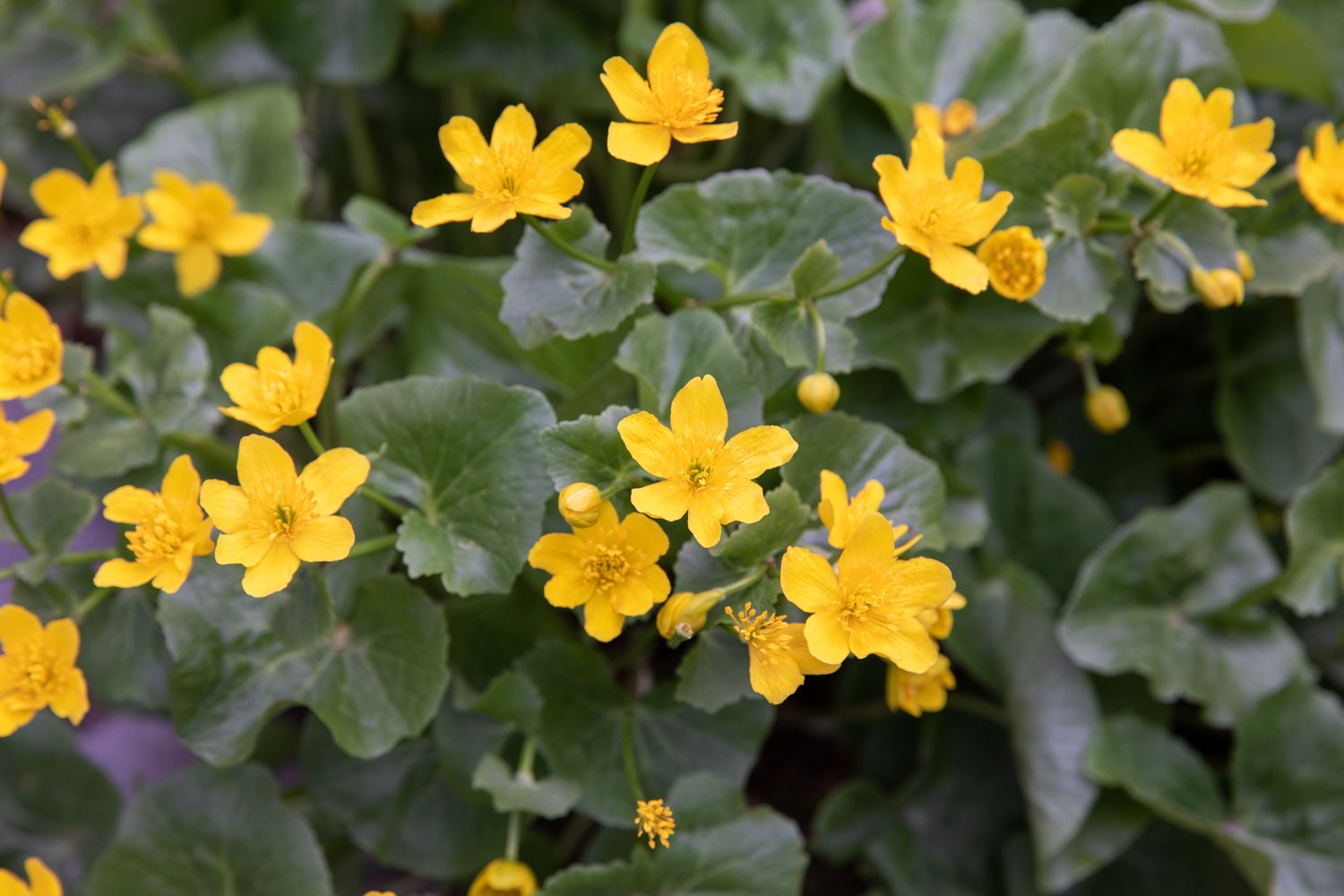
Marsh Marigold, also known as Caltha palustris, is a vibrant and fascinating plant that can be found in wetlands and along streams and ponds. With its bright yellow flowers and glossy green leaves, this perennial herb has captured the attention of nature enthusiasts and gardeners alike.
In this article, we will explore 17 intriguing facts about marsh marigold that will not only deepen your appreciation for this beautiful plant but also provide you with valuable insights into its characteristics and uses. From its medicinal properties to its symbolic meanings, marsh marigold has a rich history and a range of interesting features.
So, let’s dive into the world of marsh marigold and uncover some compelling facts about this enchanting plant.
Key Takeaways:
- Marsh Marigold, also known as Caltha palustris, is a vibrant perennial plant native to wetlands in Europe and North America. Its bright yellow flowers attract wildlife and hold medicinal and dyeing properties.
- This hardy water-loving plant symbolizes courage and plays a crucial role in wetland ecosystems. It provides food and habitat for various organisms, stabilizes soil, and helps improve water quality.
Marsh Marigold’s Scientific Name
The Marsh Marigold, or Caltha palustris, is a beautiful perennial plant that belongs to the Ranunculaceae family.
Native to Europe and North America
Marsh Marigold is native to the wetlands and meadows of Europe, Asia, and North America.
Bright Yellow Flowers
One of the most striking features of the Marsh Marigold is its vibrant yellow flowers, which bloom in early spring.
Early Pollinator
Marsh Marigold provides an important source of nectar for early pollinators like bees and butterflies, playing a crucial role in their survival.
Water-Loving Plant
As the name suggests, Marsh Marigold thrives in wet, marshy areas and is often found growing near ponds, streams, and ditches.
Medicinal Properties
Marsh Marigold has been used in traditional medicine for its diuretic, anti-inflammatory, and wound healing properties.
Hardy Perennial
This resilient plant can endure cold temperatures and is able to survive in both full sun and partial shade conditions.
Attracts Wildlife
The vibrant flowers of Marsh Marigold attract various wildlife, including birds and insects, creating a rich ecosystem in wetland areas.
Edible Leaves
The young leaves of Marsh Marigold are edible and can be cooked or used in salads. However, caution should be exercised as the plant contains toxins that can cause irritation if not properly prepared.
Symbol of Courage
In folklore and mythology, Marsh Marigold is often associated with bravery and courage, symbolizing strength in the face of adversity.
Cultivation in Gardens
Many gardeners cultivate Marsh Marigold in their water gardens or boggy areas as it adds a splash of bright color and attracts beneficial wildlife.
Spread through Rhizomes
Marsh Marigold spreads through underground rhizomes, allowing it to form dense colonies in suitable habitats.
Other Common Names
Marsh Marigold is known by various other names, including Kingcup, Meadow-bright, and Mayflower.
Folklore and Superstitions
According to folklore, Marsh Marigold was believed to have protective powers and was used to ward off evil spirits.
Ecological Importance
Marsh Marigold plays a crucial role in wetland ecosystems, providing food and habitat for various organisms and helping to stabilize soil and prevent erosion.
Dyeing Properties
The vibrant yellow flowers of Marsh Marigold can be used to create natural dyes, giving fabrics and fibers a beautiful golden hue.
Hardy Water Purifier
Due to its ability to absorb excess nutrients from water, Marsh Marigold is often planted in wetland restoration projects to help improve water quality.
As we’ve explored the 17 intriguing facts about Marsh Marigold, it becomes evident that this vibrant plant holds great significance. From its bright yellow flowers and medicinal properties to its ecological importance, Marsh Marigold is a true gem of wetland habitats. So, the next time you come across this beautiful plant, take a moment to appreciate its splendor and the fascinating role it plays in the natural world.
Conclusion
Marsh Marigold, also known as Caltha palustris, is a fascinating plant that thrives in wet environments. From its cheerful yellow flowers to its rich folklore, there are many intriguing facts about this beautiful plant.
Whether you are a nature enthusiast or a gardener looking to add diversity to your landscape, Marsh Marigold is a great choice. Its vibrant display of blossoms, resilience in wet habitats, and historical significance make it a unique and captivating addition to any collection.
So, next time you come across a marshy area, keep an eye out for the stunning Marsh Marigold. Its vibrant blooms and interesting characteristics are sure to catch your attention and leave you with a greater appreciation for the wonders of nature.
FAQs
Q: What are the optimal growing conditions for Marsh Marigold?
A: Marsh Marigold thrives in wet environments, such as marshes, streams, and pond edges. It requires full sun to partial shade and prefers soil that is consistently moist.
Q: How big do Marsh Marigold plants typically grow?
A: Marsh Marigolds can reach a height of 12-18 inches (30-45 cm) and have a spread of 12-24 inches (30-60 cm). However, their growth may vary depending on the specific growing conditions.
Q: Are Marsh Marigold flowers edible?
A: While some sources claim that Marsh Marigold flowers are edible, it is crucial to exercise caution. The plant contains compounds that can be toxic if consumed in large quantities. It is always best to consult with a knowledgeable expert before consuming any part of a plant.
Q: Can Marsh Marigold be grown in containers?
A: Yes, Marsh Marigold can be grown in containers as long as the container allows for proper drainage and is filled with a suitable soil mix. Make sure to keep the soil consistently moist to mimic the plant’s natural habitat.
Q: Are Marsh Marigold plants invasive?
A: Marsh Marigold is not considered invasive in most regions. However, it is essential to prevent its spread in natural waterways and wetland habitats to protect native plant species.
If you enjoyed learning about Marsh Marigold, why not explore more fascinating plants? Discover the incredible adaptations of wetland plantsbulrushes</wetland plants>, which thrive in challenging environments. perennial plantsHepatica's delicate beauty</perennial plants> will captivate you with its resilience and charm. And don't miss out on the vibrant yellow flowersYellow Loosestrife</yellow flowers>, a plant that adds a burst of sunshine to any landscape. Each of these plants has a unique story to tell, so dive in and uncover the wonders of the botanical world!
Was this page helpful?
Our commitment to delivering trustworthy and engaging content is at the heart of what we do. Each fact on our site is contributed by real users like you, bringing a wealth of diverse insights and information. To ensure the highest standards of accuracy and reliability, our dedicated editors meticulously review each submission. This process guarantees that the facts we share are not only fascinating but also credible. Trust in our commitment to quality and authenticity as you explore and learn with us.


